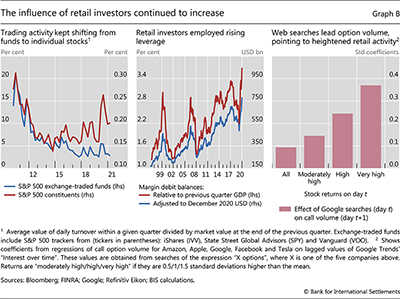The rising influence of retail investors
Recent events have drawn attention to the growing role of retail investors in equity markets. In addition to fuelling a rise in trading volumes, these investors use leverage, buy and sell options to speculate on individual companies, and rely on social media platforms to coordinate their portfolio strategies. This box documents the footprint of retail traders and discusses its impact on market functioning.
Telltale signs of retail investors' growing activity emerged from patterns in equity trading volumes and stock price movements. For one, small traders seem to be often attracted by the speculative nature of single stocks, rather than by the diversification benefits of indices. Consistent with such preferences gaining in importance, share turnover for exchange-traded funds (ETFs) tracking the S&P 500 has flattened over the past four years, while that for the S&P 500's individual constituents has been on an upward trend over the same period, pointing to 2017 as the possible start year of retail investors' rising influence (Graph B, left-hand panel). In addition, retail investors are more likely to trade assets on the basis of non-fundamental information. During the late 1990s tech boom, for instance, they sometimes responded to important news about certain companies by rushing to buy the equity of similarly named but distinct firms. Comparable patterns emerged in early 2021 – for instance, when the value of a company briefly quintupled as investors misinterpreted a social media message as endorsing its stock.
In the United States, retail investors' sustained risk-taking has been channelled through brokerage accounts, the main tool they have to manage their non-retirement funds. Brokerage accounts allow owners to take leverage in the form of margin debt. In December 2020, the amount of that debt stood at $750 billion, the highest level on record since 1997, both in inflation-adjusted terms and as a share of GDP. Its fast growth in the aftermath of March 2020 exceeded 60% (Graph B, centre panel). There is evidence that retail investors are currently taking risky one-way bets, as rapid surges in margin debt have been followed by periods of stock market declines.
In seeking exposure to individual companies, retail investors trade options. Call (put) options pay off only when the price of the underlying stock rises (falls) past a preset value, with gains potentially amounting to multiples of the initial investment. In this sense, options have embedded leverage that margin debt magnifies further. Academic research has found that option trading tends to be unprofitable in the aggregate and over longer periods for small traders, not least because of their poor market timing.
Reports in early 2021 have suggested that the surge in trading volumes for call options – on both small and large stocks – has indeed stemmed from retail activity. For example, internet searches for options on five technology stocks – a clear sign of retail investors' interest – predicted next-day option volumes. This link was particularly strong for searches that took place on days with high stock returns, suggesting that option activity was underpinned by bets on a continuation of positive returns (Graph B, right-hand panel).
Equity prices rose and fell as retail investors coordinated their trading on specific stocks through social media in January 2021. While online chat rooms were already a popular means of information exchange in the late 1990s, the trebling of the number of US internet users and the rise in no-fee brokerages since then has widened the pool of traders who can combine their efforts. In a recent episode, retail investors forced short-sellers to unwind their positions in distressed companies. A similar move in the more liquid silver market floundered a few days later. These dislocations were short-lived, not least because, in response to collateral requests from clearing houses, some brokerages limited their customers' ability to trade. Even so, it has become clear that deliberate large-scale coordination among small traders is possible and can have substantial effects on prices.
Certain actions of retail investors can raise concerns about market functioning. Sudden bursts of trading activity can push prices far away from fundamental values, especially for less liquid securities, thus impairing their information content. In a move that underscored the materiality of this issue, the US Securities and Exchange Commission suspended trading in the shares of companies that had experienced large price movements on the back of social media discussions.
Even without deliberate coordination, retail investors' inclination to use options for speculative trading can amplify market volatility. The reason is that option sellers hedge their exposure by trading in the underlying stocks, typically buying when the prices of these stocks rise and selling when they fall. This hedging strategy adds to price swings.
 The views expressed are those of the authors and do not necessarily reflect the views of the Bank for International Settlements.
The views expressed are those of the authors and do not necessarily reflect the views of the Bank for International Settlements.  See R Bauer, M Cosemans and P Eichholtz, "Option trading and individual investor performance", Journal of Banking and Finance, April 2009.
See R Bauer, M Cosemans and P Eichholtz, "Option trading and individual investor performance", Journal of Banking and Finance, April 2009.


